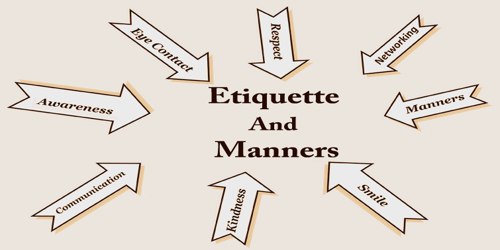As a child, you must have been told to greet your elders and visitors to your home according to your culture and tradition. You must also have been taught to be polite in company and keep quiet while others, especially your elders, spoke. Possibly, you at times grudged such schooling. Possibly, at times you even protested such disciplining. Now, certainly, you know that you can’t always behave the way you want especially in the presence of others. There are rules of behavior you have to follow in a company. We are social beings and have to consider the effect of our behavior on others, even if we are at home and dealing with our family members.
We have two terms to describe our social behavior ‘etiquette’ and ‘manners.’ ‘Etiquette’ is a French word and it means the rules of ‘correct behavior in society. The word ‘Manners’ means the behavior that is considered to be polite in a particular society or culture. Manners can be good or bad. For example, it is a bad manner to speak with food in one’s mouth. No one likes a bad-mannered person. Remember that etiquette and manners vary from culture to culture and from society to society. We learn etiquette and manners from our parents, families and various institutions, such as schools, colleges or professional bodies. There are rules of behavior for all kinds of social occasions and it is important to learn them and practice them in everyday life.
The manners that are correct in a wedding reception will not do in a debating club. Therefore, we have to be careful about etiquette and manners. We know how important it is to say ‘please’ and ‘thank you’ in everyday life. A few more polite expressions such as ‘pardon me,’ ‘excuse me’, ‘may I,’ are bound to make your day smooth and pleasant.
Here are some basic rules of etiquette:
Respect others’ personal space.
Don’t interrupt when someone else is talking.
Be a helper.
Be on time.
Don’t yell in public places.
Eat politely.
Chew with your mouth closed.
Stand in a queue.
Here are some thoughtful observations on manners and etiquette from some famous people. “Respect for ourselves guides our morals, respect for others guides our manners.”
– Laurence Sterne
“Life is short, but there is always time enough for courtesy.”
– Ralph Waldo Emerson
“The real test of good manners is to be able to put up with bad manners.”
– Kahlil Gibran
“Handsome is what handsome does.”
– J R R Tolkein
“Politeness is a sign of dignity, not subservience.”
– Theodore Roosevelt
“A man’s manners are a mirror in which he shows his portrait.”
– Johann Wolfgang von Goethe
“Whoever interrupts the conversation of others to make a display of his fund of knowledge makes notorious his stock of ignorance.”
– Shaikh Sadi
“Etiquette is a fine-tuning of education.” – Nadine Daher
















